To help the birds, go native in yards and gardens

Spring migration is nearly over. The nesting season moves into full throttle now as neo-tropical songbirds — warblers, tanagers, vireos, buntings, flycatchers and others — settle down to raise new generations of their kind before it’s time to return to winter homes in Latin America in the fall.
For Georgia’s year-round birds — bluebirds, cardinals, chickadees and others — whose nesting season actually began in March, there will be a second or even a third brood to raise before the season ends.
As Georgia naturalist Dr. Leslie Edwards noted during a recent talk to the Atlanta Audubon Society, baby birds need tremendous amounts of energy to grow quickly into fledglings. And nearly all of that energy comes from insects, especially caterpillars.
“Carolina chickadees, for instance, eat a lot of seeds, but they raise their young almost entirely on caterpillars,” said Edwards, lead author of the book “The Natural Communities of Georgia.” Research by Dr. Doug Tallamy of the University of Delaware, she noted, shows that “during the 16-18 days it takes for chickadees to fledge, a pair of adults will feed them from 6,000 to more than 10,000 caterpillars.”
A pair of bluebirds, she added, feeds their young some 300 caterpillars a day.
Caterpillars, of course, need vegetation to feed on — but not just any vegetation. Georgia’s native caterpillars and other insects have evolved over great spans of time to depend on certain native plants for nourishment. Non-natives, such as Chinese privet and Japanese honeysuckle, can’t support the huge volumes of insects needed by nesting birds.
“Chinese privet actually reduces insect abundance and diversity,” said Edwards.
The take-home message, then, is: To help the birds, plant wildflowers and other flora native to Georgia in yards and gardens. Minimize use of non-natives.
More information: https://www.atlantaaudubon.org/plants-for-birds.html
IN THE SKY: From David Dundee, Tellus Science Museum astronomer: The moon, in first quarter tonight, will “grow“ to full moon by next Saturday (May 18). Venus is low in the east just before sunrise. Mars is very low in the west at dusk and sets about two hours later. Jupiter rises out of the east before midnight; Saturn does so a few hours later.

